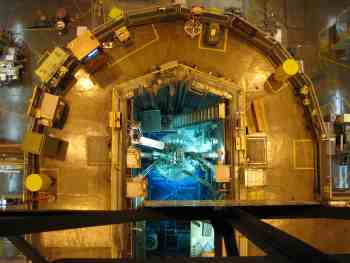The South African Nuclear Energy Corporation (Necsa) and its subsidiary NTP Radioisotopes (Pty) Ltd have won a $25 million US federal award to supply molybdenum-99 (Mo-99) produced from low-enriched uranium targets.
 |
| With its core also powered by LEU fuel elements, the Safari-1 research reactor irradiates LEU target plates to produce Mo-99 on a daily basis (Image: Necsa) |
The work on the award from the US Department of Energy's (DoE) National Nuclear Security Administration (NNSA), is based on the commercial-scale production of the medical isotope from low-enriched uranium and will be performed in collaboration with the Australian Nuclear Science and Technology Organization (Ansto).
"This significant achievement has demonstrated that South Africa has successfully implemented the world's first large scale, all LEU production of this critical medical isotope," Necsa said in a statement. NTP is one of the world's major suppliers of Mo-99, and has been working towards producing the isotope by irradiating LEU target plates instead of the traditional high enriched uranium (HEU) targets in Necsa's Safari-1 research reactor. This is seen as an important development in helping to remove HEU, which could potentially be diverted for use in weapons, from the civilian sector.
Conversion to full LEU production - Safari-1 was converted to use LEU fuel in 2009 - has presented various technological and operational hurdles, and Necsa CEO Rob Adam described the award as the culmination of many years of painstaking research and development.
The NNSA is the DoE body charged with national nuclear security with a remit stretching from the management and security of the USA's nuclear weapons through nuclear non-proliferation to naval reactor programs. Its non-proliferation efforts include working internationally to minimize the use of highly enriched uranium in civilian applications, including initiatives to convert research reactors to use LEU fuel. Minimisation of the use of HEU in radioisotope production featured in the workplan to maximise nuclear security adopted by heads of state from 47 countries at the Washington global nuclear security summit earlier this year.
Mo-99 is used in hospitals in special generators to produce the very short-lived technetium-99 radioisotope, used in a range of imaging procedures. As Mo-99 itself has a short half-life of only 66 hours steady supplies are essential. However, most of the world's supplies of Mo-99 is sourced from only five research reactors, and international supplies have been severely impacted in recent years as several of the ageing reactors have been unexpectedly unavailable.
NNSA principle assistant deputy administrator of defence nuclear non-proliferation Ken Baker described the award as "part of NNSA's commitment to developing a sustainable means of producing Mo-99 as part of a global supply network that avoids a single point of failure and does not use HEU."
Researched and written
by World Nuclear News





_13505.jpg)
_87975.jpg)
_67826.jpg)






